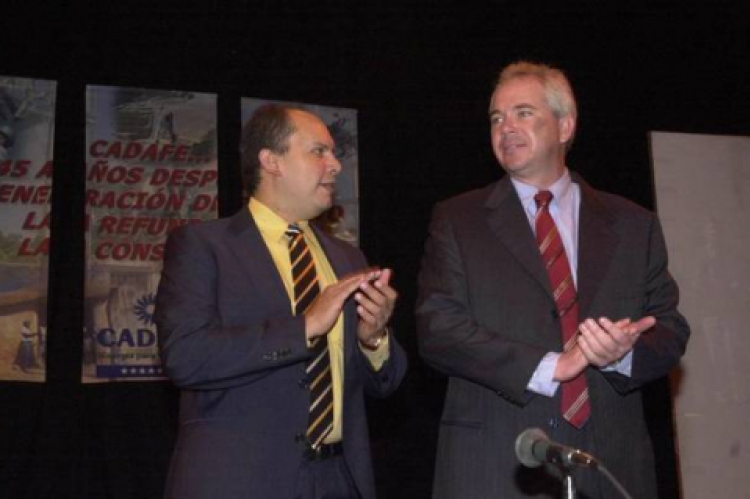RTP Noticias from Portugal posted an article yesterday that claims: "O venezuelano Nervis Villalobos, indicado como estando envolvido no caso de corrupção e branqueamento de capitais nas ligações do Grupo Espírito Santo (GES) à Venezuela, acusou a justiça portuguesa de "atitude persecutória" e ameaçou com um processo." [bold added] Translation: Nervis Villalobos, involved in corruption and money laundering in case related to Espirito Santo Group, accused Portugal's Judiciary of having a "persecutory attitude" and threatened to sue. But why is Villalobos threatening Portugal's investigating authorities? The question has to be asked because Villalobos is also part of criminal probes in Venezuela, Spain, Andorra, the U.S.A., Luxembourg and Switzerland, and has never threatened the judiciary of those countries. Why Portugal then?
Villalobos was arrested in Spain in October 2017 following a U.S. Department of Justice (DoJ) request for his involvement in a corruption scheme related to PDVSA (BARIVEN). Two months into his incarceration, Villalobos accepted to be extradited to the U.S. to face charges. However he was released in September 2018 by a court in Madrid because he managed to prove that Spain was his place of residency. The court in Madrid established that whatever his resident status, the ruling would not affect ongoing criminal probes in the U.S. Only a month after, October 2018, Villalobos was arrested again in Spain for involvement in a separate money laundering probe (Operación Carabela). This time Villalobos was suspected to have used "investment vehicles" set up by Hugo Gois -according to DoJ a "professional money launderer" and involved in a separate $1.2 billion scheme (Money Flight)- an employee of Banco Espirito Santo. In total, 130 apartments / villas / hotel were seized from Villalobos.
Gois, the Espirito Santo connection, set up a number of shells / accounts for Villalobos. Interestingly, Villalobos' account in Banco Madrid (a Banca Privada d'Andorra fully owned subsidiary) received funds transferred from his Espirito Santo account in Dubai. Banca Privada d'Andorra was shut down after being declared a "money laudering concern" by FinCEN due to its involvement in "approximately $2 billion in transactions" related to a another money laundering scheme centered also at PDVSA. Villalobos was one of the key people involved in Andorra, whose judiciary obtained thousands of documents to file charges. The evidence from Andorra points precisely at the unexplainable relation that Villalobos maintained with Rafael Ramirez, former CEO of PDVSA.
Villalobos never threatened authorities in Andorra, perhaps because the weight of evidence against him is overwhelming. The Andorra case file contains almost the entire chain of evidence of a separate $4+ billion money laundering scheme involving Villalobos with Ramirez and the Oberto Anselmi brothers (Violet Advisors). Evidence of bribes payments to Villalobos (from Oberto Anselmi) and purchase of real estate in Rome (where Ramirez used to live) are part of the summary. The same archive contains detailed contracts for commission payments between Villalobos and the Oberto Anselmi brothers, and between Villalobos and Derwick Associates, another PDVSA / BARIVEN / CORPOELEC contractor that stole ~ $1 billion.
Villalobos has been investigated in Spain in connection to $105 million worth of bribes received from Duro Felguera for obtention of contracts in Venezuela (Termocentro).
Worth noting that in the corruption cases mentioned in this article (and there are others), the person pitching the schemes directly to Ramirez was Villalobos, who has easily received more than $500 million in bribes.
Then, something extremely weird happened: Swiss authorities refused a residency application from Villalobos, claiming that his presence in the country would be "a threat to public security and a risk for Switzerland’s reputation." Imagine being a reputation risk to Switzerland... Nonetheless, Villalobos and his enablers still managed to open bank accounts, transfer hundreds of millions worth of bribe payments, and even purchase real estate in his own name.
Villalobos may have gotten a phone call from Ramirez, after Portugal's prosecutor Olba Barata found and exposed bribe payments of $47 million from Banco Espirito Santo to Canaima Finance Ltd., a shell used by Villalobos whose UBO -according to Barata- is in fact Ramirez. It could be problematic, for Ramirez specially, given that Spanish authorities have evidence linking Canaima's Espirito Santo account in Dubai to a Villalobos account at Banco Madrid.
What is evident in every case is that Villalobos is, and has been, one of Ramirez's most trusted bagmen. His legal threat is laughable and does not have a leg to stand on, in light of the amount of evidence against him in various jurisdictions. He claims that he was not a PDVSA employee, which is correct, that he was never an advisor of Ramirez, which is false, and that he never gave Ramirez any money, which is also false.

